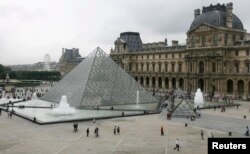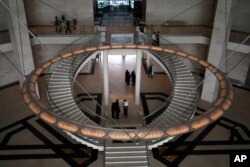I.M. Pei, one of the best-known architects of the 20th century, has died. He was 102.
Born in China, Ieoh Ming Pei moved to the United States in 1935 to study architecture at the Massachusetts Institute of Technology and Harvard University.
Pei’s works around the world include museums, government buildings, hotels, schools and other structures built with stone, steel and glass.
One of his best-known and most disputed works was built 30 years ago. Pei created a new entrance for the world-famous Louvre Museum in Paris.
Pei first spent four months studying the museum and French history. He then drew plans for a 21-meter-tall steel and glass pyramid, with three smaller pyramids nearby. It was a very futuristic style of work for the 12th-century building.
A French newspaper denounced Pei’s pyramids as “an annex to Disneyland.” An environmental group said they belonged in a desert. Others accused Pei of ruining one of the world’s greatest landmarks.
Pei said the Louvre was the most difficult job of his career. He argued that he had wanted to create a modern space that would not take away from the traditional part of the museum. He said the glass pyramids were based on the works of French landscape architect Le Notre. They honored French history.
The pyramids opened in the spring of 1989. Over the years that followed, the structure came to be loved by most, if not all, of its critics.
Other well-known Pei buildings include the John F. Kennedy Library in Dorchester, Massachusetts, the National Center for Atmospheric Research in Boulder, Colorado, the East Wing of the National Gallery of Art in Washington and the Dallas City Hall in Texas.
Pei officially retired in 1990. However, he continued to work on projects -- including museums in Luxembourg, Qatar and his ancestral home of Suzhou.
I'm Caty Weaver.
Hai Do adapted this story for Learning English based on Reuters and New York Times news reports. Caty Weaver was the editor.
________________________________________________________________
Words in This Story
architect - n. a person who designs buildings
pyramid - n. a very large structure built especially in ancient Egypt that has a square base and four triangular sides, which form a point at the top
annex - n. a building that is attached to or near a larger building and usually used as part of it











